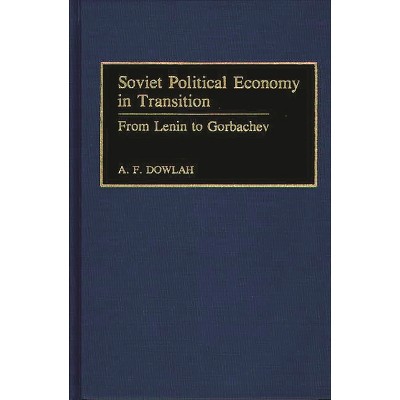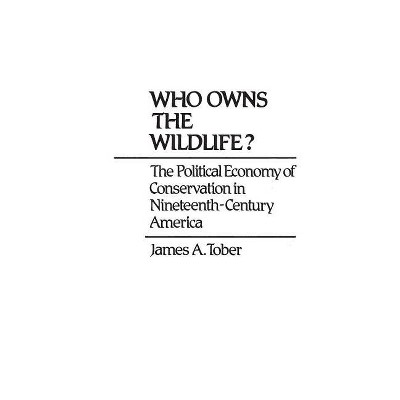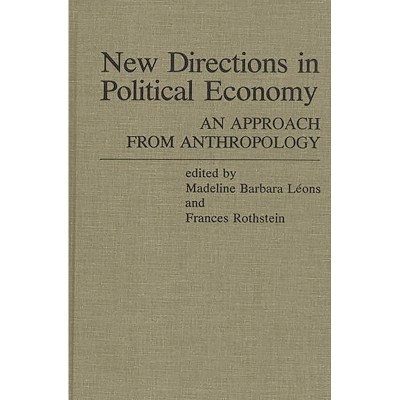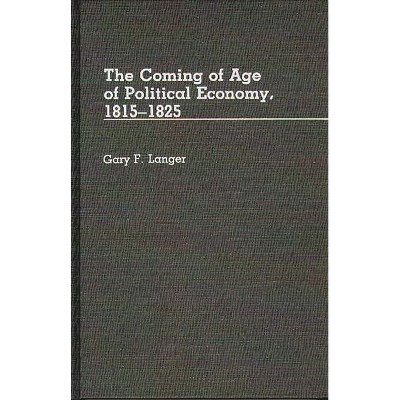Sponsored

Energy and the Rise and Fall of Political Economy - (Contributions in Economics and Economic History) by Bernard C Beaudreau (Hardcover)
In Stock
Sponsored
About this item
Highlights
- The First and Second Industrial Revolutions were about energy: steam power revolutionized 19th-century Great Britain and electric power revolutionized 20th-century America.
- About the Author: BERNARD C. BEAUDREAU is Associate Professor of Economics at Université Laval in Quebec.
- 240 Pages
- Science, Energy
- Series Name: Contributions in Economics and Economic History
Description
About the Book
The First and Second Industrial Revolutions were about energy: steam power revolutionized 19th-century Great Britain and electric power revolutionized 20th-century America. Yet political economy, the science of wealth born of the First Industrial Revolution, is devoid of energy, focusing instead on machinery or capital. According to basic mechanics, tools per se are not productive, as they are not source of energy. This book uses basic mechanics and thermodynamics to reexamine the rise of political economy as the science of wealth in the 19th and 20th centuries. The study shows that the failure of generations of political economists to formally incorporate energy into their models of production and distribution has led to the unfortunate state in which economics currently finds itself. With the inclusion of energy, important insights result. For instance, the Solow Residual in both 19th-century Great Britain and 20th-century America disappears.
Unlike previous critiques of political economy, this analysis is constructive in nature, using past shortcomings and oversights as a springboard to a more consistent model of economic activity, especially production. The book is the first of its kind to use basic physics and thermodynamics as a guide to the First and Second Industrial Revolutions, and more importantly, to show how political economists from Smith to Fisher have attempted to understand these two energy-based Industrial Revolutions.
Book Synopsis
The First and Second Industrial Revolutions were about energy: steam power revolutionized 19th-century Great Britain and electric power revolutionized 20th-century America. Yet political economy, the science of wealth born of the First Industrial Revolution, is devoid of energy, focusing instead on machinery or capital. According to basic mechanics, tools per se are not productive, as they are not source of energy. This book uses basic mechanics and thermodynamics to reexamine the rise of political economy as the science of wealth in the 19th and 20th centuries. The study shows that the failure of generations of political economists to formally incorporate energy into their models of production and distribution has led to the unfortunate state in which economics currently finds itself. With the inclusion of energy, important insights result. For instance, the Solow Residual in both 19th-century Great Britain and 20th-century America disappears.
Unlike previous critiques of political economy, this analysis is constructive in nature, using past shortcomings and oversights as a springboard to a more consistent model of economic activity, especially production. The book is the first of its kind to use basic physics and thermodynamics as a guide to the First and Second Industrial Revolutions, and more importantly, to show how political economists from Smith to Fisher have attempted to understand these two energy-based Industrial Revolutions.Review Quotes
?There can be no doubt that this book makes an extremely important point - energy in its various forms has made a fundamentally important contribution to the economic growth of the world that political economy attempts to trace.?-The Journal of Energy and Development
"There can be no doubt that this book makes an extremely important point - energy in its various forms has made a fundamentally important contribution to the economic growth of the world that political economy attempts to trace."-The Journal of Energy and Development
About the Author
BERNARD C. BEAUDREAU is Associate Professor of Economics at Université Laval in Quebec. He is the author of Mass Production, the Stock Market Crash, and the Great Depression: The Macroeconomics of Electrification (Greenwood, 1996) and Energy and Organization: Growth and Distribution Reexamined (Greenwood, 1998).Shipping details
Return details
Frequently bought together
Trending Non-Fiction

















